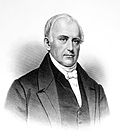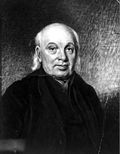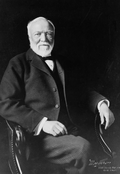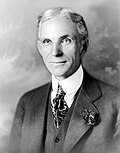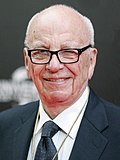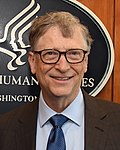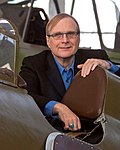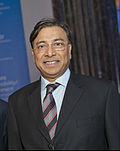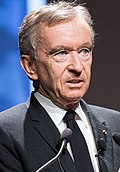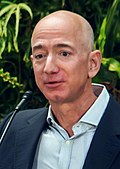Business magnate
This article needs additional citations for verification. (April 2023) |
A business magnate, also known as an industrialist or tycoon, is a person who is a powerful
Etymology and history
The term magnate derives from the Latin word magnates (plural of magnas), meaning 'great man' or 'great nobleman'.
The term mogul is an English corruption of mughal,
The term tycoon derives from the
The term spread to the business community, where it has been used ever since.Usage
The examples and perspective in this article deal primarily with the United States and do not represent a worldwide view of the subject. (January 2024) |
Modern business magnates are entrepreneurs that amass on their own or wield substantial family fortunes in the process of building or running their own businesses. Some are widely known in connection with these entrepreneurial activities, others through highly-visible secondary pursuits such as philanthropy, political fundraising and campaign financing, and sports team ownership or sponsorship.
The terms mogul, tycoon, and baron were often applied to late-19th- and early-20th-century North American business magnates in
Examples of business magnates in the western world include historical figures such as pottery entrepreneur Josiah Wedgwood, oilmen John D. Rockefeller and Fred C. Koch, automobile pioneer Henry Ford, aviation pioneer Howard Hughes, shipping and railroad veterans Aristotle Onassis, Cornelius Vanderbilt, Leland Stanford, Jay Gould and James J. Hill, steel innovator Andrew Carnegie, newspaper publisher William Randolph Hearst, poultry entrepreneur Arthur Perdue, retail merchant Sam Walton, and bankers J. P. Morgan and Mayer Amschel Rothschild. Contemporary industrial tycoons include e-commerce entrepreneur Jeff Bezos, investor Warren Buffett, computer programmers Bill Gates and Paul Allen, technology innovator Steve Jobs, vacuum cleaner retailer Sir James Dyson, media proprietors Sumner Redstone, Ted Turner and Rupert Murdoch, industrial entrepreneur Elon Musk, steel investor Lakshmi Mittal, telecommunications investor Carlos Slim, Virgin Group founder Sir Richard Branson, Formula 1 executive Bernie Ecclestone, and internet entrepreneurs Larry Page and Sergey Brin.
Business magnates
This section contains an excessive or unencyclopedic gallery of images. |
See also
- Bloomberg Billionaires Index
- Bourgeoisie
- Business oligarch
- Businessperson
- Chaebol
- Media proprietor
- Real estate investing
- Robber baron
- Software industry
- The World's Billionaires
- Russian oligarchs, the term for Russian business magnates
References
- ISBN 978-0-8018-3443-1. Retrieved 22 May 2012.
- ^ "tycoon". Merriam-Webster. Retrieved 22 May 2012.
Origin of TYCOON Japanese taikun
- ^ "tycoon". Merriam-Webster. Retrieved 22 May 2012.
First Known Use: 1857
- ^ Goodheart, Adam (10 November 2010). "Return of the Samurai". The New York Times. Retrieved 22 May 2012.
External links
- Lewis, Mark (December 13, 2001). "The Famous 15: America's Most Fascinating Tycoons". Forbes.
- "25 Tycoons Who Run the World". Business Pundit. October 6, 2010.
- "Finlayson juhlii klassikkokuosien merkeissä". MTV3.fi - Koti (in Finnish). Bonnier AB. January 18, 2010. Archived from the original on 2010-01-23.


